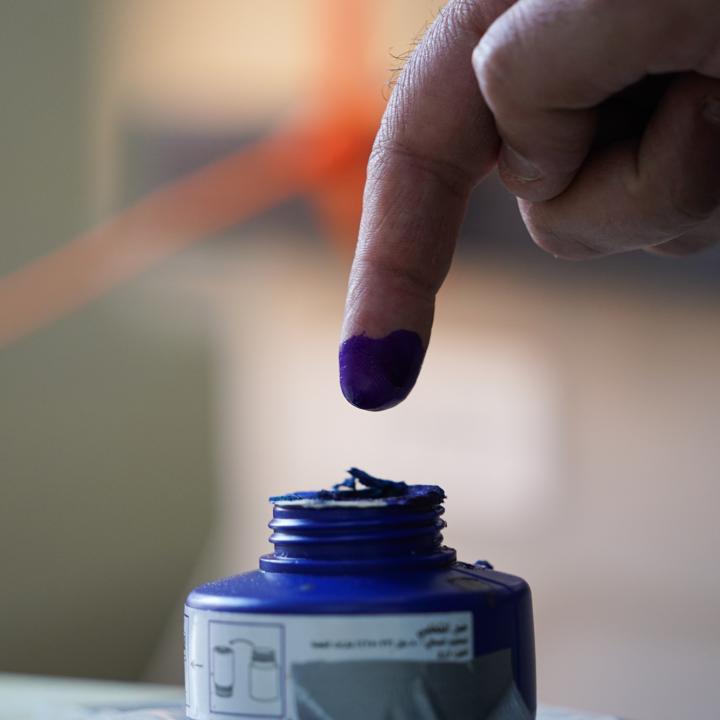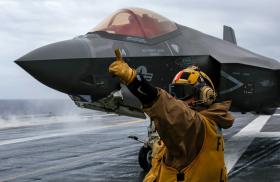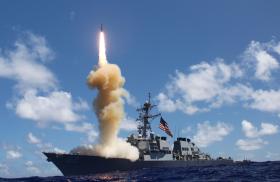
- Policy Analysis
- PolicyWatch 4129
Iraq's Pivotal Parliamentary Election

Two regional political experts join a former U.S. ambassador to discuss how the final campaign push is shaping up and what the outcome could hold for U.S. interests.
On November 4, The Washington Institute held a virtual Policy Forum with Mina al-Oraibi, Munqith Dagher, and James Jeffrey. Oraibi is editor-in-chief of the Abu Dhabi-based daily The National. Dagher is a board member and director for the Middle East and North Africa at Gallup International. James Jeffrey is the Institute’s Philip Solondz Distinguished Fellow and former U.S. ambassador to Iraq and Turkey. The following is a rapporteur’s summary of their remarks.
Mina al-Oraibi
A key variable in the November 11 election will be voter turnout, which has declined steadily since the first parliamentary election of 2005. This reflects increasing frustration with a political system widely seen as corrupt and failing to deliver for the people. The prevailing interpretation of the constitution permits politicians to manipulate the government formation process through post-election jockeying and horse trading. Not only does the majority candidate generally fail to win the prime minister’s seat, but government formation can take months. This crisis of legitimacy has been reinforced by the boycott of Muqtada al-Sadr, who won the largest bloc in the previous election but was prevented from forming a government. Regardless, the boycott reflects popular anger, especially among young people. Although Iraq does not publish official unemployment numbers, the World Bank estimates 30% youth unemployment.
Government formation is once again likely to be protracted. The U.S. government appears to have minimal interest in Iraq, and new special envoy Mark Savaya is a relative unknown with few relationships there. Meanwhile, as Tehran’s influence weakens throughout the region, it sees Iraq as strategically vital and will likely seek a role in post-election negotiations, using the growing number of Iran-linked militias who are seeking political legitimacy. Furthermore, Kurdish parties are coming to the table divided, having been unable to form their own regional government after their local elections a year ago.
Prime Minister Mohammed Shia al-Sudani himself has pursued and effectively communicated his “reconstruction and development” agenda, and many see him as a nationalist rather than a sectarian or self-interested figure. Yet corruption continues to plague the government—Sudani has been able to effectively navigate the competing interests that dominate the system, but he has not dismantled the kleptocracy.
The other main concern on voters’ minds is violence. Although it has diminished somewhat, there is still a sense that law and order are limited when it comes to vested political interests or armed groups.
Externally, Sudani has continued the outreach to the rest of the Arab world begun by his predecessor. He effectively insulated Iraq from conflict between Iran and Israel and deserves credit for cautious engagement with Syria and cooperation with Turkey over water sharing. This limited participation in regional affairs is a positive development—though given Iraq’s strategic presence and history, many see it as a “bare minimum” position that values stability over regional leadership.
Munqith Dagher
Sudani has high approval ratings—despite a recent dip, they have remained higher than those of past prime ministers. Generally, Sunni Iraqis believe the country is moving in the right direction and have more positive attitudes than Shia Iraqis toward the government, the prime minister, and the election process.
When polled about individual politicians, Iraqi respondents express the greatest confidence in Muqtada al-Sadr, followed by Sudani; no other major politician had a rating above 30%. Currently, Sudani’s Reconstruction and Development Party is likely to win by a substantial margin, followed by the (Sunni) Taqaddum and (Shia) State of Law factions.
Voter participation has declined precipitously since the 2005 election, which had a turnout of over 80%. Based on current data, this year’s election is likely to see turnout between 30 and 40%. Concerns about corruption and lack of faith in the electoral process have convinced many Iraqis not to vote, and Sadr’s boycott will likely depress this number further.
The post-election coalition negotiations will probably face the same roadblocks as in 2021, when Sadr won seventy-two seats but was blocked by the militia-dominated Coordination Framework coalition. This time, the winning party will likely strike an alliance with Mohammed al-Halbousi’s Taqaddum and Masoud Barzani’s Kurdish Democratic Party, but such a coalition may fail to meet the two-thirds majority threshold now required to select the president, who will appoint the prime minister. Meanwhile, Sudani’s relationship with the Coordination Framework—which initially elected him—is so tense that he skipped the coalition’s latest meeting.
For its part, Iran has become a less powerful regional player since the previous election, though it will still try to influence the outcome again. Internal players will undoubtedly factor the Iran-U.S. rivalry into their electoral calculations. Notably, many Iraqis prefer the United States over Iran as an economic and security partner, but perceived U.S. political influence in the country is highly unpopular. Iraqis seek a balanced partnership with America based on mutual interests.
Sudani has run a campaign based on Iraqi nationalism and economic development. The Coordination Framework’s early support of his government allowed him to spend $400 billion over the past three years, increasing government hiring and investment in construction and infrastructure projects. Overall, this has made him very popular and given him substantial credibility, particularly among the Sunni population, which serves as a key element safeguarding Iraq from an Islamic State resurgence. The files that Sudani has failed to address, however, are corruption and the power of Iran-backed militias. Although he was able to prevent these groups from participating in the war between Israel and Iran, he has made little headway on corruption.
James Jeffrey
Washington’s primary interest in the election is seeing the emergence of an Iraqi government that is stable, representative, and willing to limit Iranian influence. Although the country’s parliamentary system is somewhat dysfunctional, it also serves as a safeguard against authoritarian excesses like those of Saddam’s Iraq, Assad’s Syria, or ayatollah-ruled Iran. The United States has a strong working relationship with Sudani, so an election outcome that permits him to continue his current trajectory would be a positive one. In the context of a region generally shifting away from Iran, Baghdad’s careful restraint during the twelve-day war is a positive sign.
A coalition may emerge to prevent the frontrunner—currently Sudani—from forming a government, as has occurred before in Iraqi politics. Regardless, the U.S. outlook on Iraq will be entirely dependent on the new government’s position regarding specific issues, namely, the Hashd militias, relations with the Kurds, and Iraq’s regional role.
In the past, a unified Kurdistan Region has tended to be both a stabilizing factor in Iraq and a decisive vote in post-election negotiations, but its current divisions could prevent the Kurds from playing that role. To be sure, the United States may still end up exerting some pressure on them to shift the government formation process, as Washington has more influence over the Kurds than over Baghdad. Yet current Kurdish political dysfunction may limit the value of this leverage.
The Iraqi parliament faces the same pitfalls as other parliamentary systems; for example, France and Germany have both endured agonizing government-formation processes in recent years. Washington’s ultimate concern is the eventual formation of a government rather than protracted deadlock, since instability in Iraq would invite both popular unrest and more Iranian influence.
Even if Tehran’s influence does surge after the election, however, it may not be capable of leveraging that influence into tangible regional power. Iraq is clearly critical to Iran’s strategy as other proxies have waned, yet unlike Hezbollah or the Houthis, the Iraqi Hashd are not immediately useful as a weapon against Israel and the United States. Because they were never directly involved in the fighting and have not routinely faced Israeli military force, the Hashd are paradoxically both more intact and less immediately threatening to regional security than other Iran-backed groups. Neither Iraq nor the United States has an interest in the Hashd embedding themselves further into the Iraqi state. That being said, if their only role in Iraqi politics is to siphon resources from the state and nominally answer to Iran without participating in active militant activity, it would be an undesirable but tolerable outcome for Washington.
Ultimately, Iraq has maintained a democratic system since 2005, which marks a dramatic departure from its prior history. The political and economic developments of the past year represent great cause for optimism, despite the challenges endemic to the neighborhood.
This summary was prepared by Kate Chesnutt. The Policy Forum series is made possible through the generosity of the Florence and Robert Kaufman Family.





